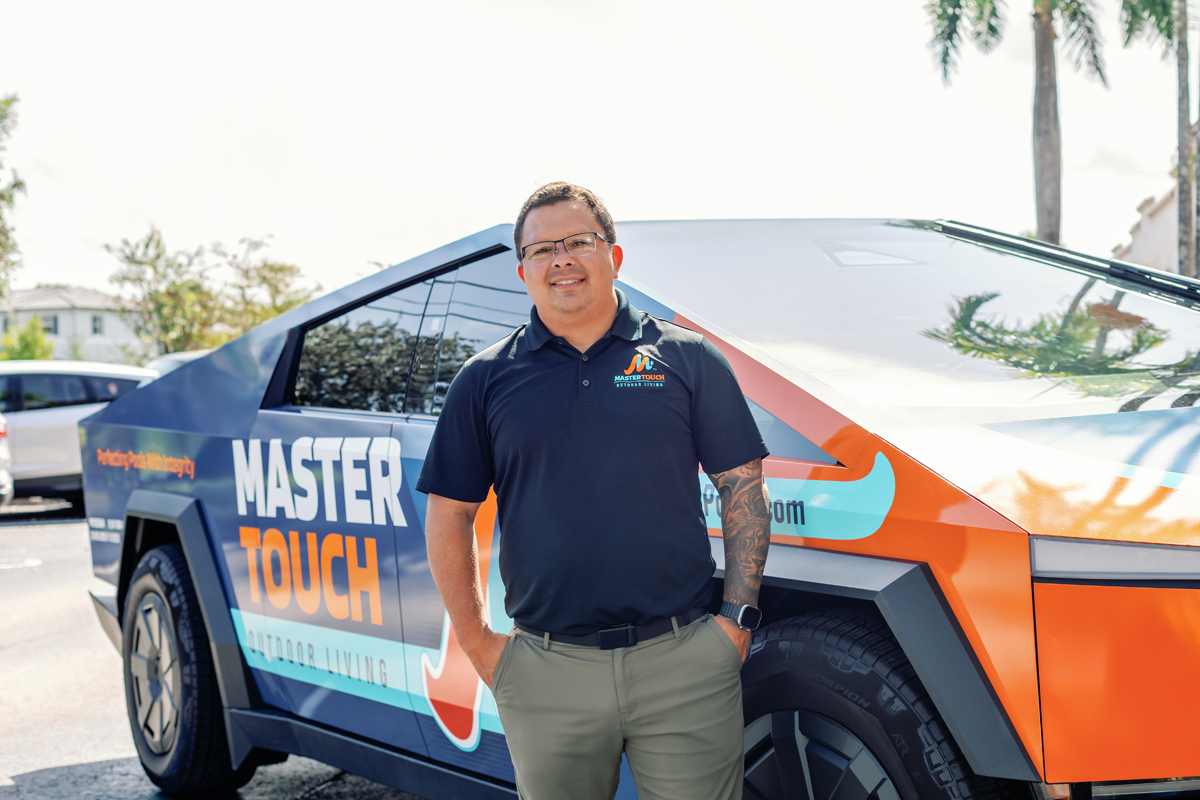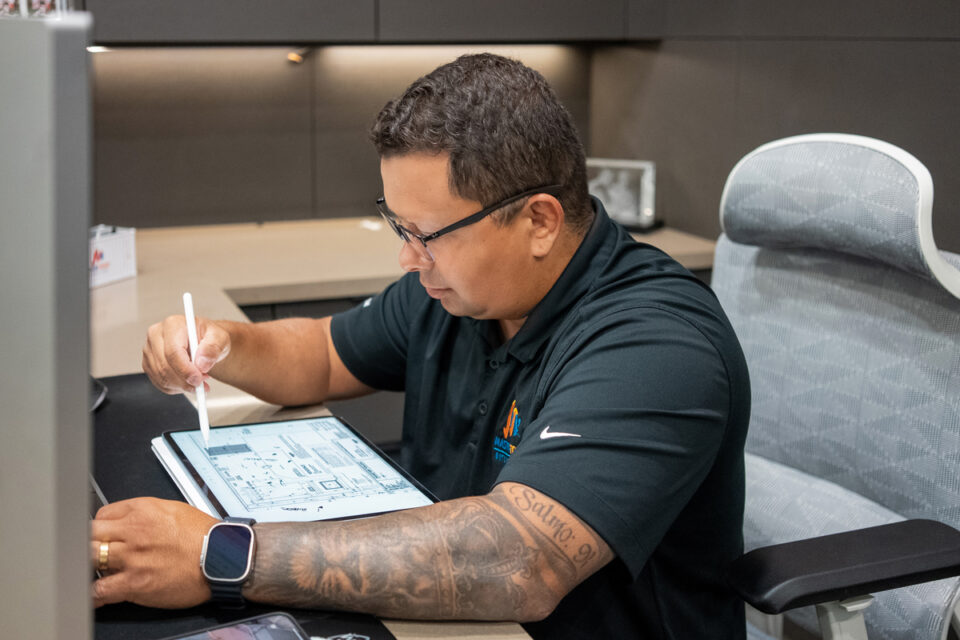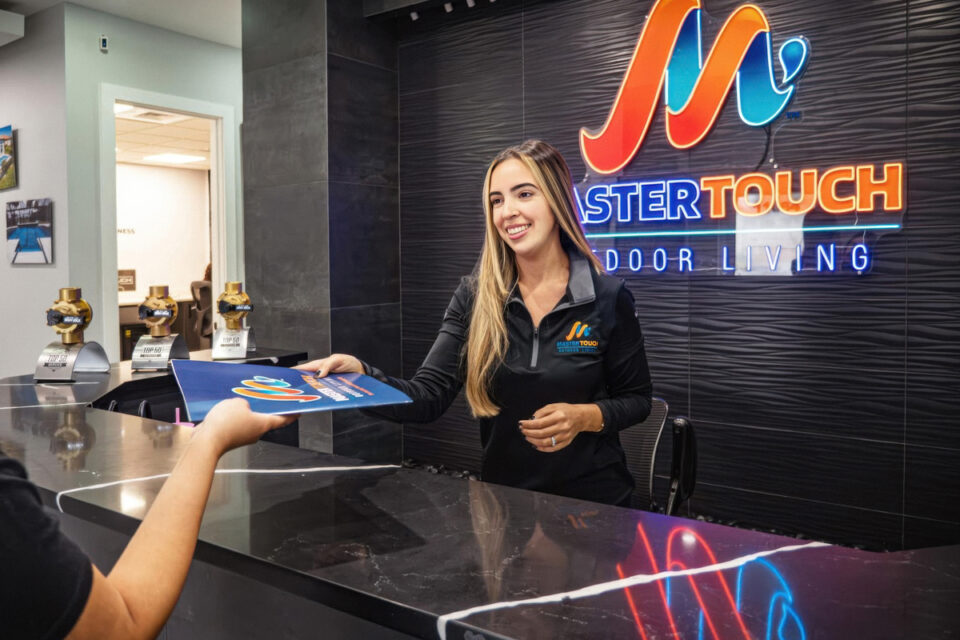Smarter Systems, Greener Results
How tech enables sustainability


When most people talk about sustainability, they reach for buzzwords: solar, offsets, eco-friendly. But for Nilson Silva, owner of Master Touch Outdoor Living, a high-efficiency pool service and construction company in Florida, sustainability isn’t a slogan — it’s a byproduct of doing business better.
By fusing artificial intelligence, electric vehicles, custom software and reuse strategies, Silva built a business where sustainability is baked into every job, every estimate and every drop of chlorine.
“Every inefficiency is a form of waste,” Silva says. “Fix the inefficiency, and the sustainability follows.”
Smart fleet, smaller footprint
Silva’s first big shift was in his fleet. Tired of constant repairs and ballooning maintenance costs, he leased Teslas — including Cybertrucks — and reassigned their role in the business.
These vehicles are used in initial job walkthroughs, which include valve labeling, site documentation, equipment explanations and client expectation setting.
“We were spending $10,000 to $12,000 a year just keeping trucks alive,” Silva says. “Leasing electric vehicles cut that down drastically, and the write-offs are just as good.”
Every EV is GPS-tracked and recharged at the company’s building, which is prepped for rooftop solar pending HOA approval.
Software that reduces waste in every form
Off-the-shelf software didn’t work for a hybrid service/construction company — so Silva built his own.
The custom system routes jobs, stores client data, prompts staff with the right intake questions and flags inefficiencies before they become costly. But more importantly, it does all of that without paper, confusion and excess travel. His staff are routed directly to the correct side of a customer’s home, while back at the office automated scripts reduce miscommunication and repeat visits. Any missed task or forgotten detail is tracked, analyzed and corrected in real time.
“If I save five minutes per pool, and multiply that across 10 stops a day, that’s a real reduction in time, fuel and labor,” Silva says. “That’s sustainability most people don’t think about.”
AI that prevents problems before they happen
AI runs deep in Silva’s business — but not in the dystopian, job-replacing way. Instead, it acts as a coach, a quality checker and an early-warning system. Sales ride-alongs are recorded and analyzed to refine training materials, while customer calls are transcribed and reviewed to improve service quality and consistency. These tools help streamline operations, reduce mistakes and shorten the learning curve for new staff.

Looking ahead, Silva is developing a system that uses AI to analyze weekly pool photos — scanning for subtle changes in water clarity or color that could indicate algae or chemical imbalances. The goal is to catch potential issues before they require a site visit or customer complaint.
“If I don’t have to send a truck to check something a camera already saw, that’s fuel we don’t burn and time we don’t waste,” Silva says. “It adds up.”
He envisions a future where AI can evaluate hundreds of pool images per client, identify trends over time and issue alerts only when something truly needs attention — turning thousands of routine checks into a single, efficient click.
Reusing materials: The overlooked green win
Not every sustainable move needs to be high-tech. Some of the biggest wins come from old-school resourcefulness — making the most of what’s already on hand.
Lumber from demo jobs is carefully salvaged — nails removed, planks reused. Broken pool heaters and motors are stripped for parts and resold or repurposed. Solar-powered jobsite cameras reduce the need for drive-bys on projects up to an hour away.
These aren’t flashy sustainability moves — but they’re effective. And intentional.
“Wood is expensive and parts are valuable,” Silva says. “If we throw them away, we’re not just wasting money — we’re wasting material.”
Data that drives sustainable decisions
Nilson’s custom software tracks key performance metrics like conversion rates on estimates, pool counts per technician, return on investment from marketing channels and client service history and lifetime value. This lets him optimize routes, eliminate underperforming ad spend and ensure no technician is over- or underutilized. In other words, he’s driving sustainability through business intelligence.
“You can’t reduce waste if you don’t know where it’s happening,” Silva says. “Our software shows us everything — in real time.”

Serving customers sustainably, too
It’s not just about operations. Customers benefit from the same mindset.
“We’re not here to sell junk — if a customer doesn’t need it, we won’t push it,” Silva says. “Our job is to find the most efficient, sustainable solution for their lifestyle.”
Electric heat pumps are recommended over gas where appropriate, saving money and cutting emissions. High-efficiency automation systems are offered not for upsell, but because they save time — for both the customer and the tech. No unnecessary replacements are suggested — only what’s needed, when it’s needed.
“Fluidra is probably our No. 1 partner when it comes to pool equipment,” Nilson says. “Without Fluidra we couldn’t be in business, to be honest. They have very reliable automation where we can check and reduce pump usage and light usage. We don’t have to leave the office to adjust a customer’s automation. We implement that on every pool and spa combo.”
Sustainability isn’t always solar panels and marketing spin. Sometimes, it’s a Tesla replacing a clunker. It’s a photo flagged by AI. It’s a five-minute route shortcut. It’s salvaged lumber, clean code and a company that doesn’t just work harder — it works smarter.
In Silva’s world, the future of green business is simple:
Efficiency is sustainability. And it pays.
